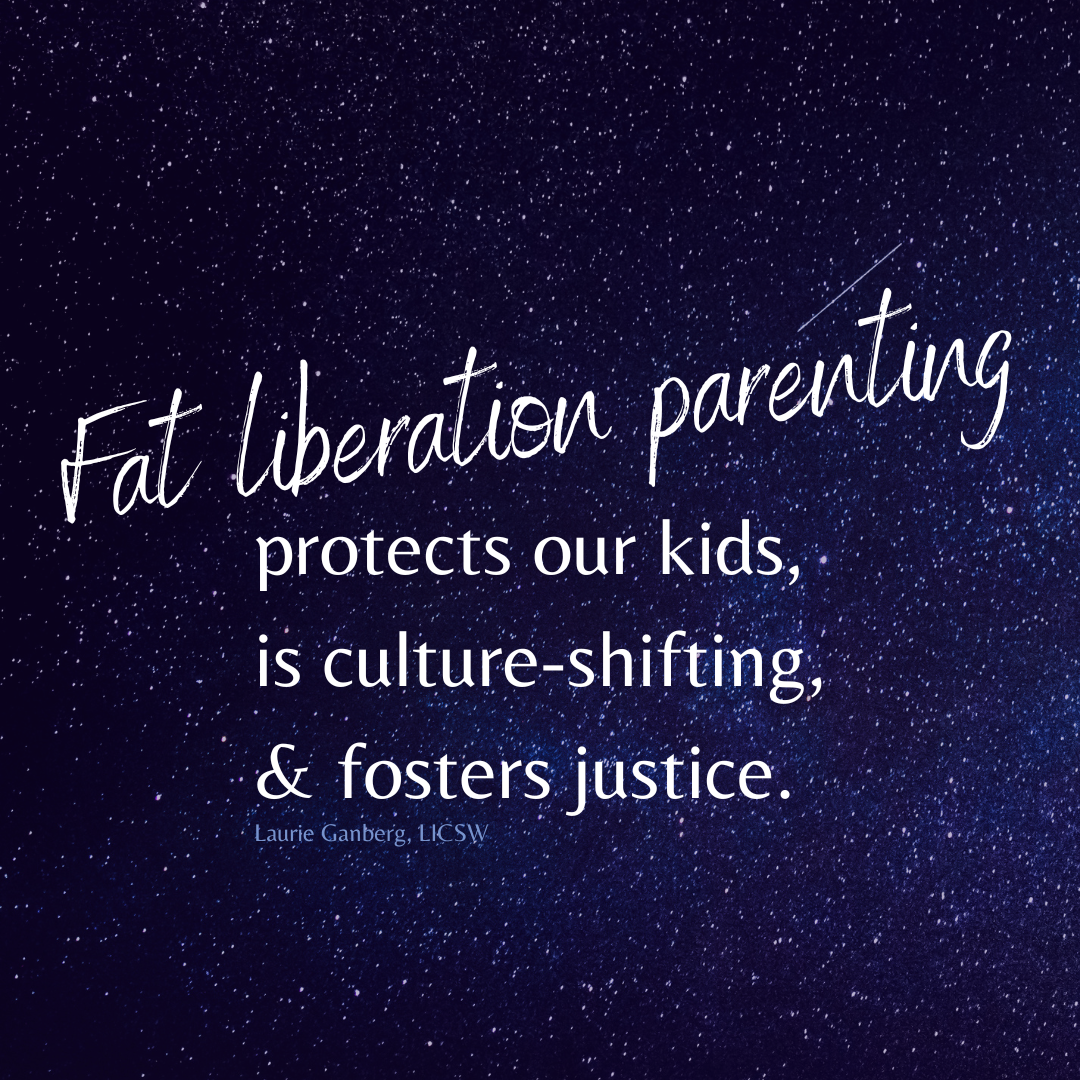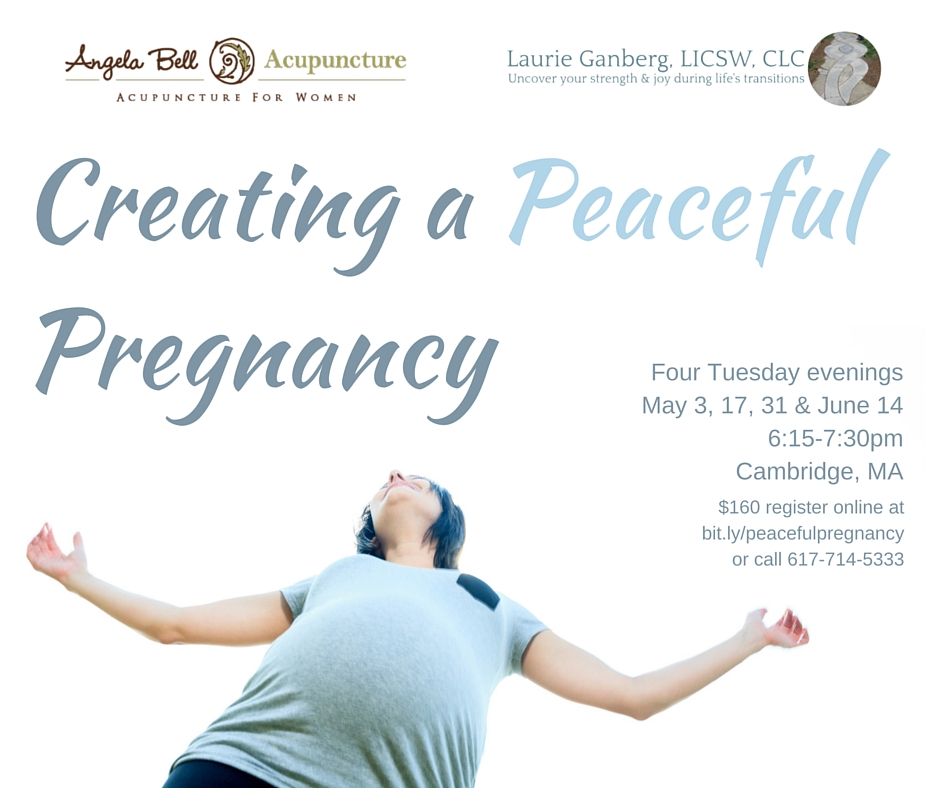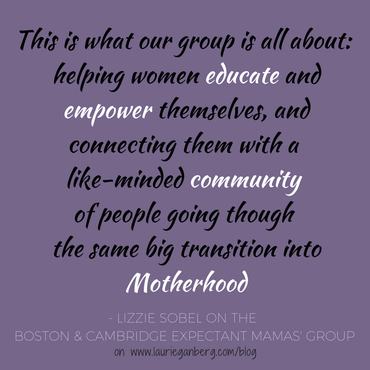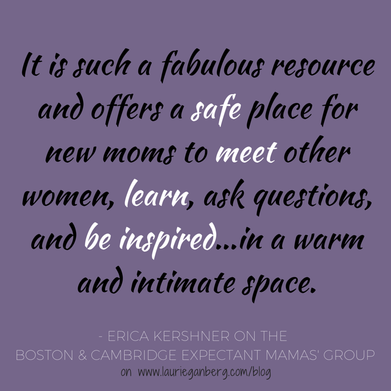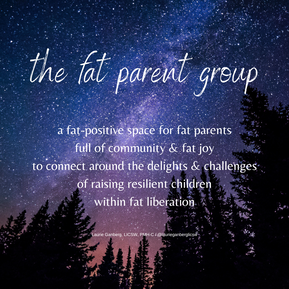
While the intersection of fat liberation and parenting can be an amazing counter-cultural, anti-oppression practice, it can also feel like a lonely place.
But you're not alone and you deserve community. That's why I'm creating a Fat Parent Group. The Group will be an opportunity to gather with other fat parents who *get* it; receive and lend support; and process the joys & challenges of raising resilient children. The group will be facilitated by me, Laurie Ganberg, LICSW (fat therapist and parent), but it's not therapy. It's a chance to gather with other fat parents who value raising kids to trust their bodies, free from diet-culture and anti-fat bias. And you can join from anywhere! Meeting on the second Wednesday of the month in 2023: August 9, September 13, October 11, November 8, December 13 @ 4:00-5:15pm (PST) Logistics
This group will be a chance to gather with and get to know a small group of other pregnant women while learning -- and practicing -- a number of strategies that can help you create more peace in your pregnancy, birth, and motherhood. You can read more about the group here.
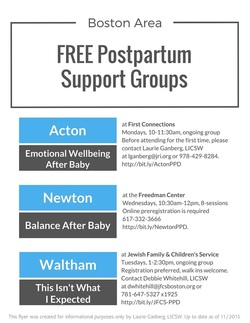 Latest update of the flyer of FREE postpartum support groups that focus on postpartum emotional complications like postpartum depression, mood, and anxiety disorders. This is a great resource for birth, postpartum, and lactation professionals to share with clients while providing education about prevalence, risk factors and signs to look out for. Other postpartum groups can be found at the Postpartum Support International of Massachusetts website. The next session of my postpartum group will start in January 2016. Adjusting to Motherhood is a small, 6-week group for women experiencing adjustment challenges or emotional complications in the postpartum year or after adopting an infant. Learn more about Adjusting to Motherhood...
I've been getting lots of great responses in my survey of groups and classes for pregnant women, parents-to-be, and new parents. Please, keep them coming! If you're expecting a child, have a young child, or work with expectant and new families, please share your thoughts in the survey below. Responses are anonymous, but if you have any feedback or groups you want to share with me directly, please feel free to contact me! And if you want to be sure to get the compiled results and hear about next steps to meet the needs in the community, sign up for my newsletter.
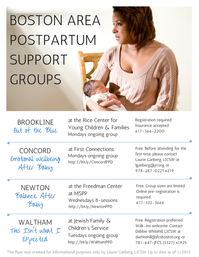 I've written before about why I think support groups are helpful. This resource is an informational flyer about four of the postpartum support groups in the Boston area. There are other groups that are run periodically by individual providers and other groups further afield. I find that with my practice in Cambridge and the work I do in Concord, these are the ones that I'm continually referring to, so I thought I'd make an easy flyer to share. I hope that lactation consultants, doulas, other therapists, OBs, midwives, childbirth educators and any one else that works with pregnant or postpartum women might share it with their clients so that if a new mom needs a group for support in the postpartum period with postpartum depression, anxiety, or general adjustment stress and challenges, they'll know where to turn!
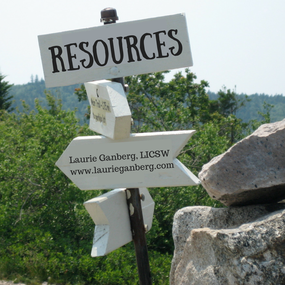 I've been doing some volunteering for Postpartum Support International of MA so I'm especially eager to share that we have been updating the provider and support group listings available on the PSI of MA website or by calling their warmline at 1-866-472-1897. What's a warmline you ask? You call and leave a message and within 24 hours, a volunteer will get back to you to answer questions about postpartum depression, anxiety, and other adjustment challenges, as well as help connect you to providers and support groups in your area. If you're troubled what you or a family/friend is experiencing in the postpartum period and don't know where to start, the PSI of MA warmline is a great place to turn to talk to a knowledgeable, supportive trained volunteer. This post is part of the RESOURCES series where every Thursday I feature websites, organizations, and information about perinatal emotional complications, parenting, therapy, reproductive health, and more. If you have a suggestion for a resource you'd like to see profiled, please let me know in the comments! How did you come to start offering and be involved with the Expectant Mamas' Group? LS: When I really started seeing a lot of pregnant women in my practice, they were consistently telling me that they did not have any pregnant friends and were hoping to develop a community of people going through pregnancy at the same time they were. I initially started the group with a childbirth educator who wanted to start it as a paid program, but we had trouble getting it off the ground. She decided to stop working on it, but instead of shutting it down, I decided to keep it going as a free weekly discussion. It took some time to gain momentum, but since Erica joined it has become much better, more consistent, and with a wider variety of topics covered. EK: With my move to Boston in February 2013, I immediately became involved in the birthing community as a birth doula and photographer. I met Lizzie at the Partners in Perinatal Health Conference a few months after my move. She told me about the group and after coming to one meeting as a guest speaker I was hooked! It is such a fabulous resource and offers a safe place for new moms to meet other women, learn, ask questions, and be inspired.  I'm so excited to feature a two-for-one interview with Dr. Lizzie Sobel and Erica Kershner, the leaders of the Boston & Cambridge Expectant Mamas' Group. I hope you already know about this fabulous, free resource for pregnant women in the Cambridge area, but if not, head over to their Meetup page to learn about the group and upcoming speakers. Full disclosure: I'll be visiting on February 16th to talk about how couples can prepare for the postpartum period based on my Becoming Parents workshop. What could a newly pregnant woman expect if she went to a group? LS: We pick a different topic each week; sometimes Erica and I talk about a specific subject, sometimes we show a film about pregnancy or birth, and sometimes we invite special guests to speak with a wide range of expertise, such as home birth midwifery, breastfeeding, meditation, and more. No matter what the topic, a woman can expect to meet other pregnant women in the area, have a space to learn about pregnancy and birth, and also have lots of opportunities to ask questions and get answers. EK: We love keeping it as a casual discussion and we try to leave plenty of time for questions at the end. You can find the topics for each week posted on the meetup website. The Breathing Room, where we meet, is a warm and intimate space. It offers a great setting for our group. On a weekly basis we get anywhere from 3-15 guests which can include partners, friends and family. What happens after a woman gives birth? Do you ever hear from her again? LS: We love getting updates from our mamas about how their birth went. Many women tell us that they have made lasting connections with others in the group and consistently get together with them and their babies after they deliver. This is what our group is all about: helping women educate and empower themselves, and connecting them with a like-minded community of people going though the same big transition into Motherhood. EK: We love to hear from women after they give birth! It is always such a joy to hear the news from women who have shared and found value in the space. We have had many of the mamas come in as guest speakers to share their birth stories with the group and we want them to know they are always welcome back. What other resources or supports do you wish were available for pregnant or postpartum women in the Boston/Cambridge area? LS: I hear a lot of stress and anxiety about women going back to work and trying to balance their careers with their children. It would be awesome to see some kind of mentorship program where a pregnant woman could be connected with a working mom in her industry, to ask her questions about childcare, work/life balance, and just to have an emotional support person who understands what she is going through. [An aside from Laurie: I think this is such a great idea!] EK: Our group is unique in that it is geared toward pregnant women. There are many new moms groups offered around the Cambridge area but often the pregnancy groups are harder to find. Many of the women who come to the group are first time moms who are either new to the area, or don't have many friends who have children themselves. They are looking to meet other women that they can talk with and relate to. It would be a wonderful thing if there was more education around prenatal physical and mental wellness. Lizzie, tell us about being a chiropractor who treats pregnant women... LS: The most common complaints that bring a pregnant woman into my office are: low back pain, pubic symphysis pain, and round ligament pain. I also see a ton of women coming because their baby is not in an ideal position for birth: presenting breech, transverse, or occiput posterior. Chiropractic care can help with virtually any pregnancy related or non-pregnancy related ache and pain, ranging from migraine headaches, to wrist pain, to knee pain, to hip pain. I have also helped women who have urinary incontinence, constipation, and acid reflux, though this is not usually why they are presenting to the office. I have always wanted to help women have safer, easier, and more natural births. I believe very strongly that birth is a natural process, and that every woman has the innate intelligence to give birth without the use of drugs or surgery. After graduating chiropractic college, I started a year long postgraduate program in Westwood, MA through the International Chiropractic Pediatric Association. We met for an entire weekend each month for a whole year and learned all about treating pregnant women and infants and children of all ages. We learned practical adjusting, and also all the theory and information behind treating these populations. This training gave me the knowledge and confidence to start working with these unique populations. I immediately connected with the amazing birth community of Boston, and am able to help fill the great need for these services. I work very differently than many chiropractors. My adjustments are extremely gentle, with no cracking, twisting or popping. Most people feel extremely relaxed and even fall asleep during the treatments! If you are scared of going to a chiropractor, give me a call! I can guarantee that the adjustments will be comfortable and not at all scary. Erica, tell us about being a birth doula & photographer... EK: Dr. John Kennell once said "If a doula were a drug it would be unethical not to use it". Whether or not you are planning a natural childbirth, there are numerous benefits to hiring a doula. One of the biggest benefits is choosing an experienced birth worker that you know and trust who will be with you on your labor day. When birthing at a hospital, you most likely will have strangers coming in and out of your room throughout labor and birth. The doula (that you chose) will be with you from active labor until after the birth. She is working for you and no one else and is there to help you do all that is possible to get what you want out of the birth experience. She will be 24/7 support- there to guide and answer your questions- as you get closer to your estimated due date. I started doing birth photography soon after I began working as a doula. I studied photography at Mason Gross School of the Arts. It started by offering my doula clients photos and I was soon after being hired just for the photography portion. A few months later I found myself doing pregnancy, newborn and family sessions as well! There is so much beauty, love, and emotion surrounding birth. As a lifestyle photographer my favorite moments to capture are the raw emotion that happen in such intimate spaces and times. There is nothing more fulfilling than hearing from a client how much they treasure and are moved by the images. I want to thank Dr. Lizzie Sobel of Wholesome Healing Chiropractic and Erica Kershner of Birth Your Roots for answering my questions, and most importantly, for offering such a great resource to the community with the Expectant Mamas Group. Have any follow up questions? Post them in the comments and we'll see if we can answer them!
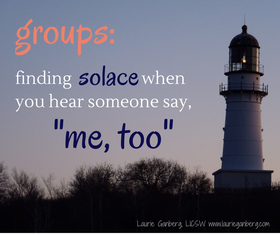 For the first time mother, a new moms group can be an anchor during long days of on-demand feedings and unpredictable naps. It's a commitment outside the house. No one cares if there's spit up on the baby's (or your) outfit. And you can find reassurance that others are going through the same challenges, while hearing from the experienced moms of babies a few months older that it does in fact get better - or at least change. Groups combat the stir-crazy. When your mind immediately imagines getting into an accident every time you put your baby in his car seat; when the pure physical ache of grief floods you each time you try to stand up; when you are facing yet another roller coaster month of hope and despair and anger; when you can't stop yourself from yelling at your child you can feel enveloped in a fog of isolation.
For these individuals dealing with postpartum emotional complications, loss, infertility, parenting challenges—and so many more issues—a support group can be a lifeline. The mere act of being in a room with others fights that isolation. In a group, you hear that others have said/thought/felt/done similar things. They nod, they pass the tissues, they laugh with you, and their eyes tear up because they recognize your story. Sometimes you have the perfect resource or a "been there done that" to share that helps someone else. Sometimes you just want to go to report a great success. You can leave a support group more confident, less alone, with a tiny bit less stress, with an idea to implement, simply lighter after a good cry or a vent or a laugh. You can find solace in a group. Resources:
|
Therapy, Groups, Supervision, Consultation, Training in Seattle, WA and online in Washington state
Laurie Ganberg, LICSW, PMH-C (#LW60673320) ~ Specializing in Perinatal Mental Health, Trauma, & Fat Liberation
Now practicing through Fiddlehead Therapy, PLLC with online services and in person in Mountlake Terrace, WA
Home | Privacy | Contact | Zoom Link
© 2019-2024 All rights reserved
Laurie Ganberg, LICSW, PMH-C (#LW60673320) ~ Specializing in Perinatal Mental Health, Trauma, & Fat Liberation
Now practicing through Fiddlehead Therapy, PLLC with online services and in person in Mountlake Terrace, WA
Home | Privacy | Contact | Zoom Link
© 2019-2024 All rights reserved

